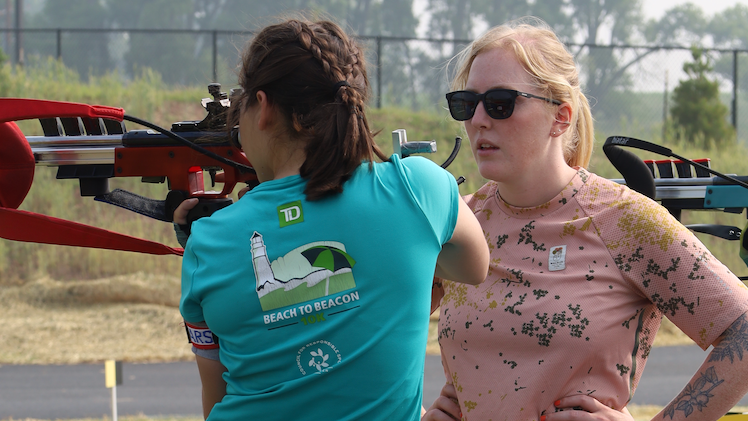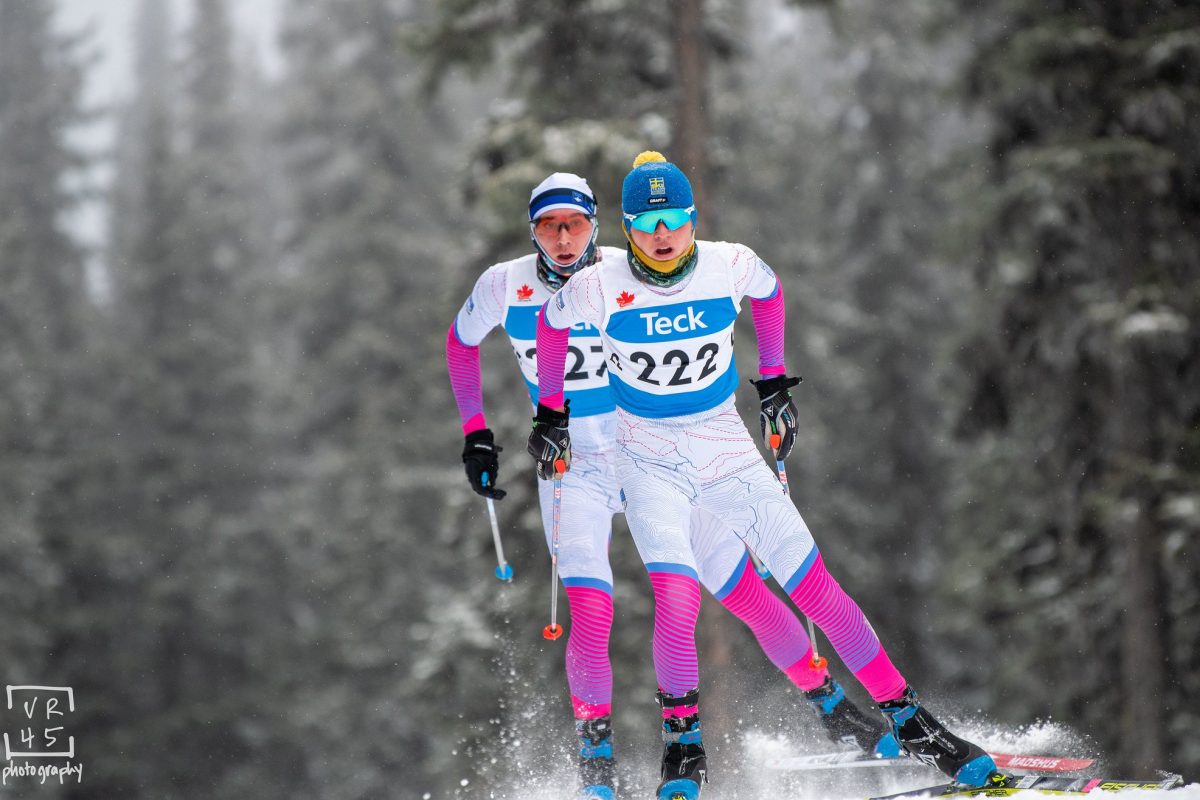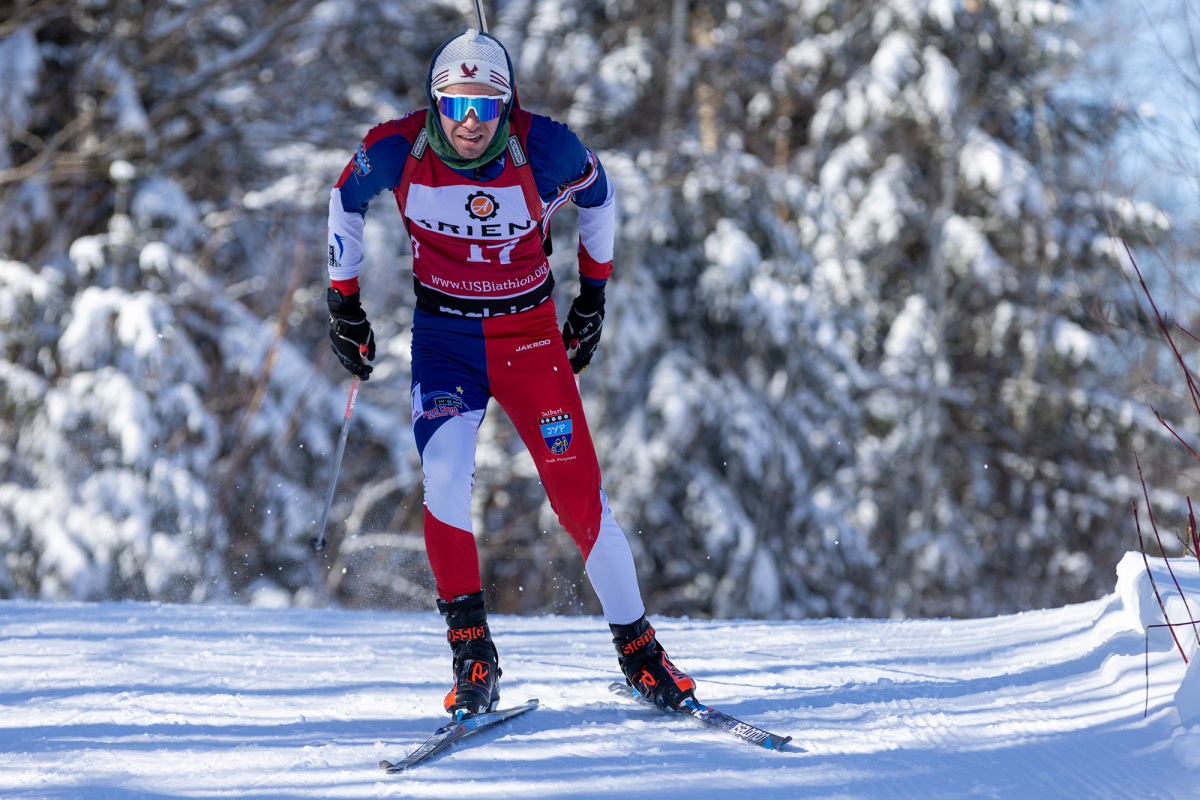
U.S. Biathlon Nationals might not actually feature all the best biathletes in the country, but so far it has proved one thing: the team selected to compete in Europe is really, really fast.
Saturday didn’t seem auspicious for anyone, with rain blanketing the West Yellowstone course and every biathlete winding up soggy. But for the second time in as many races, the two World Championship team members who decided to compete at U.S. Nationals took big wins, this time in 10 and 12.5 k pursuits.
In the men’s race, Leif Nordgren skied to a minute and a half victory over Mark Johnson; Nordgren had four penalties to Johnson’s six.
“It’s certainly fun to have Leif here to race against,” Johnson wrote in an e-mail. “He’s a great teammate and someone I hope to learn from this week.”
Even though Nordgren had won the sprint by a minute, the two did have a chance to go head-to-head thanks to a decision to modify the pursuit format. While racers did start in the order that they finished the sprint, as usual, the time gaps were replaced by five-second start intervals.
“I actually wasn’t alone for too much,” Nordgren told FasterSkier. “They started the only junior, Casey Smith, right in front of our group. I skied the first loop with him, then I missed two and he cleaned and moved ahead a little bit, as well as Mark Johnson. I had to play a little catchup on the next two loops, then in the standing stages I started to get a gap on those two and it only grew until the end.”
In fact, Nordgren was never alone – and neither was anyone else. With all of the different age divisions starting back to back, there were dozens and dozens of racers on course at all times, racing different distances and intermixing on the range.
Johnson was happy to finish second just as he had in the sprint, but said that he’d been expecting better performances, and maybe to be closer to Nordgren, who had a mixed bag of results at World Championships and anchored the U.S. relay team to tenth place.
“While I’ve managed two second placed finishes thus far, the performances have left me hoping for more,” Johnson wrote. “I haven’t been able ski at the speeds I’ve come to expect this season. I do need to remember, however, that it is late in the season now. For tomorrow’s mass start competition, I’m hoping to continue to shoot well and find a new rhythm skiing.”
Johnson didn’t seem to be too bothered by his inability to find his highest gear, however, and said he was enjoying Nationals to the fullest. He’d been helping out with a junior development camp and done some spring skiing before the weather turned rainy. Overall, he was impressed with the event.
“Despite the consistent heavy rain over the last few days, the organizing committee has done a great job preparing and maintaining the course for these competitions,” he wrote. “While I’m currently having a tough time staying dry, I can certainly attest that West Yellowstone can deliver some perfect spring skiing conditions.”
Michael Gibson of Vermont Collegiate Biathlon finished third, 2:21 behind Nordgren.
Can Nordgren go for the three-peat in tomorrow’s mass start? He hopes so, but the rain has him doing just that – hoping.
“I wasn’t feeling super great today,” he admitted. “I think skiing in the rain for the last four days is getting to me, with a little sore throat and chest congestion. But whatever – looking forward to the pursuit tomorrow, then out of the rain!”
* * *

In the women’s 10 k, Annelies Cook was even more dominant, picking up an almost four-minute win over fellow national team members Laura Spector and Corrine Malcolm.
In an interesting twist, exactly how much she won by was not clear until after the race, when Spector and Malcolm saw their times adjusted.
“The range was sort of a mess,” Malcolm explained. “There are only 20 lanes here instead of 30, and at any given time there were 75 of us out on course. With four shooting stages overlapping, you get the picture! There was some yelling. Some frantic activities. In biathlon, hunting for a point to shoot at isn’t part of our normal race procedure, but you just have to roll with it.”
Spector and Malcolm had been going back and forth for much of the race – unlike Cook, who was out on her own – and in the end, Spector was awarded a 19-second credit and Malcolm five seconds after national team coach Patrick Coffey, who had been using a stopwatch on the range, tallied up how much time each had spent looking for a place to shoot. Although the results placed them less than a second apart, with Spector in second +3:53 and Malcolm in third +3:54, Malcolm had finished first, and there had been no sprint to the line.
“I didn’t know how much time they would give either one of us,” she told FasterSkier. “And with one more penalty, faster skiing just didn’t cut it in the end. I think it’s kind of silly that it came down to 0.3 seconds without getting to actually duke it out.”
Still, Malcolm didn’t begrudge Spector her time adjustment. After sitting out part of the training season with injuries and then much of the winter with illness, she was just happy to be racing.
“Truthfully, I’m happy to share the podium with Annelies and Laura,” she said. “These gals are more or less veterans on the team with years of World Cup, World Championships, and Olympic experience. If anything, getting to rub shoulders with them is fine with me.”
Ahead of them, Cook was in a league of her own, not only skiing fast but accruing a single penalty over four stages compared to seven for Spector and eight for Malcolm. It was some of her best shooting of the entire season.
“I wish I could have done that in all of those pursuits I got lapped in on the World Cup,” Cook lamented.
Her secret? Cook said that she sung “Row, Row, Row Your Boat” in her head to avoid thinking about shooting.
Because she started first, she was never sure whether her teammates were about to catch her, and so didn’t let up even though she actually had a large lead.
“It is definitely exciting to start as number one and knowing that everyone is chasing you,” she told FasterSkier. “I had no idea where the other girls were the whole race, so I just kept thinking if I clean, then I will be okay. I think I am skiing pretty well right now and that is a good confirmation of the whole winter for me!”
Cook is at the stage in her career where she is clearly strong enough compared to the American field to race in Europe, but it’s not always easy to place in the fifties and sixties week after week on the World Cup. She said that races like U.S. Nationals were hugely valuable.
“It is always fun to win a race, especially when you don’t get that all winter and your goals have to be very personalized,” she explained. “I didn’t have any pressure and on top of that, it is a very low key atmosphere here. I always like to come to U.S. Nationals. I think it is really important for as many people to come as possible because the sport is so small here in the U.S., and it is good to be around everyone you don’t see all winter and who support you from here.”
And what of coming straight from Ruhpolding, where biathlon is anything but small? First, she had to deal with the time change, which she said also lowered her expectations. But aside from that, “a race is a race.”
“It’s like comparing New York City to Saranac Lake, New York,” Cook said, invoking her hometown. “But in the end…. you go as hard as you can.”




2 comments
nyctvt
March 18, 2012 at 8:50 am
Chelsea could you add the link to the results page.
Chelsea Little
March 18, 2012 at 10:57 am
Yes, sorry – when I published last night, the organizers still hadn’t posted final results, just provisional ones. Now that the updated results have been released I have added them.